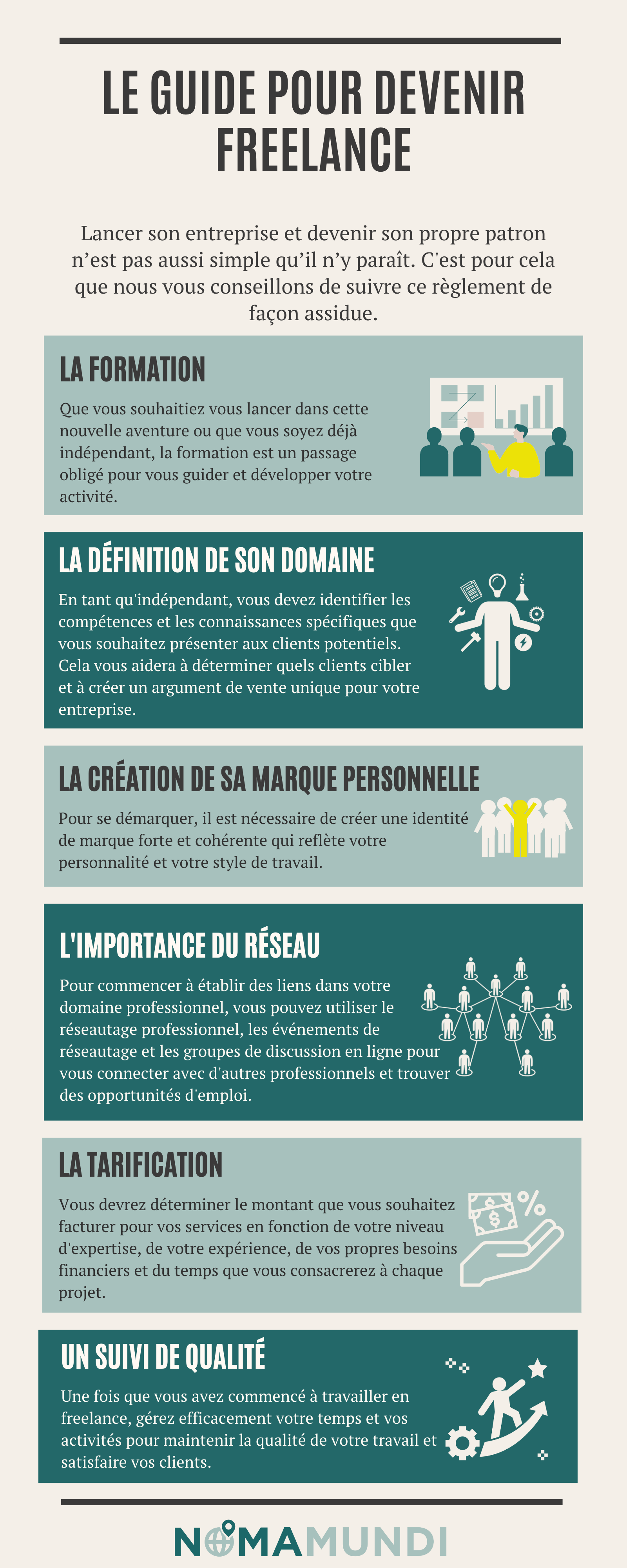
The flexibility to determine your own schedule as well as the freedom of choice leads many employees to want to become freelancers. Becoming self-employed requires following steps. Indeed, starting your business and becoming your own boss is not as simple as it seems.
Train to start or develop your business
Training exists to guide and advise you in this change of life. When you find yourself being already an active freelancer, it can be interesting to have an outside opinion that can help you develop and question some of the axes of your business plan.
Of the mentoring platforms dedicated to freelancers have recently appeared and offer you personalized support. This is particularly the case ofAmbroise Debret, a real figure in digital nomadism and freelancers, who decided to launch his online training. The latter allows you to deliver valuable advice through modules, application exercises or even concrete case studies. Freemote Full therefore allows employees wishing to reorient themselves or simply obtain information to do so in a simplified manner. This training guides the worker through all stages of the creation of your future business. Ambroise personally accompanies each freelance towards achieving your goals. This training also includes expert masterclasss as a bonus (i.e. around ten training courses in one), model scripts (quotation, contract, content, prospecting, negotiation, price increase) + role plays to practice. Group coaching with individual monitoring by Ambroise for 6 months is also organized. This made it possible to create a real private community and a Freelance collective to help each other with more than 350 independents. This teaching is aimed at employees who want to sell their skills as freelancers to be free, to freelancers who want to find more clients and increase their rates, and to all those who want a new start with the best springboard to become independent and why not digital nomad. If you would like to know more, a free masterclass is available.
Define your area of expertise
First of all, you must identify the skills and knowledge that you want to highlight as a freelancer. This will help you target your customers and stand out from the competition.
Take an inventory of your skills: Start by making a list of all the skills you've acquired during your professional life, whether they're related to your education or work experience. This may include technical skills, communication and customer relations skills, and project management skills. Identify your interests: Think about what topics you are passionate about and what areas you have experience in. This can help you determine an area of expertise that interests you and in which you are motivated to work.
Research the job market: Research job market trends and job opportunities in your field of interest. This will help you determine which skills are most in demand and target your customer base.
Test your area of expertise: Once you've identified a potential area of expertise, test it by offering your services to potential clients and receiving feedback on your work. This will help you refine your area of expertise and ensure you are on the right track. Be open to continuous learning: the world of work and the skills required are constantly evolving. Be open to learning new skills and diversifying your area of expertise to stay competitive and find new work opportunities.
Establish your personal brand
To differentiate yourself, it will be necessary to create a strong and coherent brand image that reflects your personality and your work style.
Think about your personality and work style: Start by determining what defines you as a professional and what sets you apart from the competition. This can include your personality, your communication style, your approach to work and your professional values.
Create a name and logo: choose a name that represents you and is easy to remember. You can also create a logo that reflects your personal brand and will be easily recognizable to your customers.
Develop an online presence: create a professional website that presents your work and skills in a clear and attractive way. Remember to regularly update your website with fresh content and create a profile on professional social networks such as LinkedIn.
Create communication tools: develop communication tools such as business cards, resume and cover letter that reflect your personal brand. Make sure these documents are consistent and professional, and that they highlight your skills and experience clearly and concisely.
Be consistent: make sure your personal brand is consistent across all your communication materials, whether it's your website, social media, emails, and presentation materials. This will help you make yourself known and stand out from the competition.
Establish your network
To start making contacts in your area of expertise, you can use professional social networks, networking events, and online discussion groups to connect with other professionals and find work opportunities. Don't hesitate to research companies and organizations that might be interested in your services and get in touch with them to introduce them to your work.
Participate in networking events: attend professional events such as conferences, trade fairs or workshops which allow you to meet and interact with other professionals. This will help you expand your circle of contacts and find work opportunities.
Use professional social networks: Create a profile on professional social networks such as LinkedIn and use them to connect with other professionals and find work opportunities. Don't hesitate to participate in online discussion groups and follow the profiles of people who work in your area of expertise.
Volunteer or mentor: participate in volunteer or mentoring projects that allow you to meet new people and develop your skills. This will help you build your network while making a difference in your community.
Use online freelance platforms: many online platforms allow freelancers to find clients. Register on these platforms and create a profile that highlights your skills and experience. Don't forget to stay informed of new opportunities that come online.
Makes some noise : Make yourself known by publishing content on your blog or on social networks, sharing your achievements and participating in professional events. This will help you get noticed and build your network.
Maintain your network: Once you've established your network, don't forget to maintain it by staying in touch with your contacts and regularly offering them new opportunities or interesting content. This will help you make yourself known and grow your freelance business.
Define your pricing
You will need to determine how much you will charge for your services based on your level of expertise, your experience and the time you will dedicate to each project. Don't forget to factor in your business expenses such as insurance and travel costs.
Your level of expertise: your pricing should reflect your level of expertise and experience in your area of expertise. If you're a beginner, you may have to accept lower rates than your more experienced peers.
The time you spend on each project: your pricing should take into account the time you spend on each project. The more complex and time-consuming the project, the higher your pricing should be.
Costs related to your activity: Your pricing should cover costs related to your freelance activity, such as travel costs, communication costs, and insurance. Competitor rates: Research the rates charged by other freelancers in your area of expertise. This will give you an idea of what customers are willing to pay and help you determine pricing that is competitive without being too low.
Your own financial needs: make sure you set pricing that will allow you to cover your living expenses and grow your freelance business. Don't be tempted to accept low rates just to get work, as this could put you in financial difficulty in the long run.
Manage your freelance activity
Once you start freelancing, make sure you manage your time and business effectively to maintain the quality of your work and satisfy your clients. This can include creating a project tracking system, setting clear delivery deadlines, and managing your cash flow.
Establish a work routine: set regular working hours and stick to them. This will help you be productive and better organize your time.
Manage your time effectively: use time management tools such as calendars or apps to help you plan your tasks and better organize your work.
Set goals: set short- and long-term goals for your freelance business and work purposefully to achieve them. This will help you focus on important tasks and grow your business strategically.
Pay attention to your financial health: manage your budget and cash flow to keep your freelance business on a financial level playing field. Don't hesitate to seek help from an accountant or financial advisor if you need advice.
Communicate with your customers: maintain regular and professional communication with your customers to avoid any misunderstandings and effectively manage your relationship with them.
